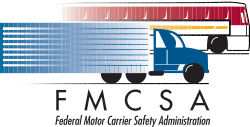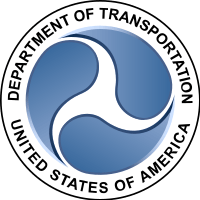Federal Motor Carrier Safety Administration
 FMCSA logo | |
| Agency overview | |
|---|---|
| Formed | January 1, 2000 |
| Jurisdiction | United States government |
| Headquarters | Washington, D.C. |
| Employees | 1,000 |
| Annual budget | $668.523 million (FY15), requested[1] |
| Agency executive |
|
| Parent agency | US Department of Transportation |
| Website | Federal Motor Carrier Safety Administration Website |
The Federal Motor Carrier Safety Administration (FMCSA) is an agency in the United States Department of Transportation that regulates the trucking industry in the United States. The primary mission of the FMCSA is to reduce crashes, injuries and fatalities involving large trucks and buses.
History
The agency was established as a separate administration within U.S. Department of Transportation on January 1, 2000, pursuant to the "Motor Carrier Safety Improvement Act of 1999."[3] FMCSA is headquartered in Washington, D.C. and employs more than 1,000 people in all 50 States and the District of Columbia, all dedicated to improving the safety of commercial motor vehicles (CMV) and saving lives.
Main functions
In carrying out its safety mandate to reduce crashes, injuries, and fatalities involving large trucks and buses, FMCSA:
- Develops and enforces data-driven regulations that balance motor carrier (truck and bus companies) safety with efficiency;
- Harnesses safety information systems to focus on higher risk carriers in enforcing the safety regulations;
- Targets educational messages to carriers, commercial drivers, and the public; and
- Partners with stakeholders including Federal, State, and local enforcement agencies, the motor carrier industry, safety groups, and organized labor on efforts to reduce bus and truck-related crashes.
Leadership
Raymond P. Martinez is currently the Administrator of the FMCSA. He was sworn in by Secretary of Transportation Elaine Chao on February 28, 2018. Previously, Martinez served as Chairman and Chief Administrator of the New Jersey Motor Vehicle Commission.[4]
Cathy F. Gautreaux became the Agency’s Deputy Administrator in November 2017 after serving as the Executive Director of the Louisiana Motor Transportation Association for 29 years.[5][6]
Organization
The FMCSA is divided into 8 offices:
- Office of the Administrator: MC-A
- Office of Administration: MC-M
- Office of Chief Counsel: MC-C
- Office of Chief Financial Officer: MC-B
- Office of Enforcement: MC-E
- Office of Policy: MC-P
- Office of Research and Information Technology: MC-R
- Field Operations: MC-F
Field offices
The field organizations deliver program services to FMCSA partners and customers. This organization consists of Field Operations, Service center and State-level motor carrier division offices.
These offices answer questions and provide guidance concerning the Federal Motor Carrier Safety Regulations.
Main programs
Compliance, Safety, Accountability (CSA)
Compliance, Safety, Accountability (CSA) is described by FMCSA as its "data-driven safety compliance and enforcement program designed to improve safety and prevent commercial motor vehicle crashes, injuries, and fatalities".[7] This highly controversial program oversees carriers’ safety performance through roadside inspections and crash investigations, issuing violations when instances of noncompliance with safety regulations are uncovered. The Agency’s safety investigation team and state law enforcement partners are small compared to the millions of CMV companies and commercial driver license (CDL) holders nationwide. A key component of the CSA program – known as the Safety Measurement System (SMS) – relies on data analysis to identify non-compliant and unsafe companies to prioritize them for enforcement interventions.
While the methodology for calculating SMS safety scores has evolved over time in response to suggestions from stakeholders, the program has proven effective at identifying unsafe, high-risk carriers. FMCSA is expected to publicly release additional changes to SMS designed to strengthen the Agency’s ability to identify companies for investigation before they are involved in a crash. The program's future remains in doubt as it has been the subject of heavy criticism from the DOT's own Inspector General, the Government Accountability Office, and Congress itself in the FAST Act. That Act requires the National Research Council of the National Academies of Science (NAS) to conduct a thorough study of the Compliance, Safety, Accountability (CSA) program, specifically the Safety Measurement System (SMS).[8]
Hours of Service (HOS) and Driver Restart Study
In July 2013, FMCSA updated HOS regulation to help reduce the incidence of CMV driver fatigue on the nation’s roadways. The final rule required truck drivers who use the “34-hour restart” provision to maximize their weekly work hours to limit the restart to once a week and to include in the restart period at least two nights off duty from 1:00 to 5:00 a.m., when one’s 24-hour body clock needs and benefits from sleep the most.
In December 2014, Congress passed the FAST Act, which suspended the new 34-hour restart provision in the HOS rule and instructed FMCSA to study its effectiveness. In 2015, FMCSA selected Virginia Tech Transportation Institute (VTTI) to conduct the largest naturalistic study of its kind that the Agency had ever undertaken. FMCSA anticipated releasing the findings in 2017.
National Registry
Implemented in 2014, the National Registry rule requires all Medical Examiners (ME) who conduct physical examinations and issue medical certifications for interstate CMV drivers to complete training on FMCSA’s physical qualification standards, pass a certification test, and demonstrate competence through periodic training and testing. CMV drivers whose medical certifications expire must use MEs on the National Registry for their examinations.
FMCSA has reached its goal of at least 40,000 certified MEs signing onto the registry, meaning drivers can now find certified medical examiners throughout the country who can competently perform their medical exam. FMCSA is preparing to issue a follow-on “National Registry 2” rulemaking that will require MEs to submit medical certificate information on a daily basis. These daily updates, which FMCSA will transmit to states electronically, will dramatically decrease the chance of drivers falsifying medical cards.
Who is covered by FMCSA regulations
All non-exempt commercial motor vehicles that cross state lines, including big-rig trucks, are subject to the federal motor carrier safety regulations. If these semi-trucks are operating within one state, they need to abide by state-equivalent motor carrier safety regulations. The intent of the regulations is to cover all persons and entities involved in operating commercial vehicles, including:
- Drivers
- Hiring managers
- Trainers
- Supervisors
- Managers
- Dispatchers
- Other people whose action affects drivers and commercial motor vehicles
The Federal Motor Carrier Safety Regulations (FMCSRs) set forth minimum standards for those involved with the operation of commercial motor vehicles in interstate commerce, in order to cover all people and entities involved in interstate operation of these trucks.
Consumer Protection
Look Before You Book
Overall, buses and motorcoaches are a safe and convenient means of travel. However, disreputable companies and unqualified drivers contribute disproportionately to what are often highly publicized crashes. The Look Before You Book campaign encourages trip planners and passengers to think about more than price and to consider safety first when choosing bus companies and drivers. The program features DOT’s first app – SaferBus – that provides safety data on each bus company under FMCSA’s jurisdiction. The primary audiences for this campaign are travel planners that serve faith-based organizations, seniors and student groups.
Protect Your Move
Of the estimated 35 million Americans who move each year, about 600,000 hire a company to move their household goods across state lines. While most of these movers are legitimate businesses that do professional work, FMCSA receives about 3,000 complaints annually about deceptive practices and fraud by dishonest operators.
The Protect Your Move program aims to protect consumers and counter interstate moving fraud in two ways: 1) by educating consumers who are preparing to move to make informed decisions about moving companies and avoid being taken advantage of by a disreputable mover; and 2) by providing tools and information to victims after moving fraud has occurred to help them resolve mover disputes and/or file fraud complaints and seek arbitration or legal action.
See also
References
- ↑ "Fiscal Year 2015 Budget Estimates". 21 March 2014.
- ↑ "Administrator". 5 March 2018.
- ↑ Public law -106-159; Accessed 2010-12-16
- ↑ "Administrator". 2014-08-18. Retrieved 2016-09-09.
- ↑ "Deputy Administrator". Federal Motor Carrier Safety Administration. 2017-11-22. Retrieved 2018-03-13.
- ↑ "Gautreaux begins tenure as FMCSA's deputy administrator". Fleet Owner. 2017-11-27. Retrieved 2018-03-13.
- ↑ "CSA - About CSA". csa.fmcsa.dot.gov.
- ↑ "FAST Act: Compliance, Safety, Accountability". Federal Motor Carrier Safety Administration. 2016-01-29. Retrieved 2017-01-07.
Sources
1. Federal Motor Carrier Safety Administration - About Us
2. Federal Motor Carrier Safety Administration - Key Programs
External links
| Wikimedia Commons has media related to Federal Motor Carrier Safety Administration. |

